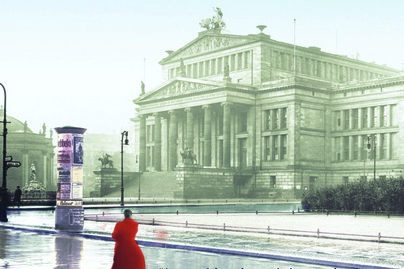
Whenever I convince someone to read this book, I can think of no easier way than to quote its opening sentence. Hitler is right there, second word, so you know it’s not going to be an overly cheerful read. But the fact that our narrator, just casually, is in the bath, tells us that it’s not going to be a typical tale about Third Reich politics. We’re not going to follow the Fuhrer around and grow frustrated with all the nonsense. We’re going to focus in on the details of the unfortunate lives of a few forgotten revolutionaries, who float somewhere between real and fictitious, and we’re going to feel something spectacular for them.
History, as it is unfolding, seems much less clear than it does with hindsight. With hindsight on your side, shouting that disaster looms seems simple. As we follow All That I Am through observing Ruth, Dora, Toller and Hans, a group of politically active exiles, the urge to scream at the oblivious becomes even more acute. Of course their rights are being violated! Of course Germany is amassing arms! Of course it’s not just rhetoric!
Written in 2011, All That I Am is set in a time when hindsight was not a vantage point the British and United States governments had, and the world’s understanding of human rights was far more tenuous than it is today. In fact, human rights as we now understand them in a legal sense did not exist in the 1930s, when the book is set. All That I Am shows Europe on the brink of World War Two, on the cusp of the atrocities that, thanks to history, we know are going to happen. It’s because of those atrocities that we have a Universal Declaration of Human Rights. The frustration at not being able to warn the characters the book makes you love comes from 2012, a vantage point not even Toller has in the book, writing his second draft of history.
While the refugees have been granted visas in England, they must present every three months to “beg His Majesty the King of England to be allowed to stay.” Ruth describes the experience as something akin to a medical test, where you feel fine until you present to the doctor, and then every possibility that you could test positive bubbles to the surface.
“Our English visas also stipulated ‘no political activities of any kind’. But our lives would only have meaning if we could continue to help the underground in Germany and try to alert the rest of the world to Hitler’s plans for war.” p. 160
The exile is hardest on Hans, who not only faces a language barrier far greater than Dora and Ruth’s, but finds his way of life, of flitting between circles and making contacts, utterly unbearable in the foreign land. He is quick to take offence, and at the edge of Ruth and Toller’s stories we see him slowly losing his sense of self, and along with it, any sense of bravery.
He sees kindness as condescension, and the niceties of 1930s British culture as a kind of doublespeak, constructed to conceal the truth.
“Why would they assume,” his voice was thin with shame and rage, “we want to be like them?” p. 165
As Auden says to Toller “All that we are not stares back at all that we are”. While we’re never inside Han’s head, never understand which events most chip at his personality, we watch Ruth’s heart break for him slowly, and we glimpse at the circumstances in 1930s Germany dire enough to make even a once brave revolutionary a Gestapo informant.
It’s not only Hans who becomes complicit in the Nazi atrocities leading up to the war. Much of the book is set not in Germany but in London and New York, and much of the book’s tension comes from the anxiety in the characters in contrast with the indifference of the countries they have taken refuge in.
“The British government was insisting on dealing with Hitler as a reasonable fellow, as if hoping he’d turn into one.” p. 160
Toller is writing and reminiscing in New York, and it is through his secretary, Clara, that we are shown the lack of refuge for those fleeing the Nazi regime and of fates which are now historically notorious. Clara’s brother is on the SS St Louis, a ship full of refugees which was granted permission to dock at Cuba only to have that permission withdrawn upon arrival. The St Louis was subsequently denied entry by the United States and Canada and sent back to Europe, where many of those aboard died at the hands of the Nazis.
It was a situation which seems bizarre and heart wrenching when reading about Clara, the composed, stoic companion of Toller in his final days, locked away in his New York hotel room. We see her anguish, and their disbelief that the United States would not let the refugees in, knowing what could await them should they return home. The parallels between those on the St Louis and the refugees arriving in Australia on boats is certainly noteworthy.
The importance of a fair trial is pummelled home twice in the novel. The first is in a part of the book where you’re most convinced everything could turn out all right, even if you have relented and Googled each character’s fate.
While Nazi Germany trials “poor van Lubbe”, accused of starting the Reichstag fire, Dora coordinates a counter trial in London, planned for the week before the Nazi’s trial, to draw the world’s attention. Ruth, normally quite realistic, is swept up in the elation of it all.
“I was swept up into something public, protective and British … I glimpsed a future in which these months in exile would be a small, strange part in our lives. The world would come to its senses. It would withdraw its support for Hitler and we could go home.” p. 219
The second instance is right at the novel’s conclusion. I don’t want to spoil the entire thing, so I’ll leave it to discuss at the All That I Am Read & Rights event on 12 June. But think about how important it felt, in that last chapter, that something be resolved. For history, for Ruth, and for Toller, it seems so important that the book’s final trial is fair and thorough.
All that I Am has been nominated for the 2012 Miles Franklin Literary Award. The winner will be announced on 20 June. You can tweet your thoughts on the novel as you read by following @ReadandRights and using #AllThatIAm.


